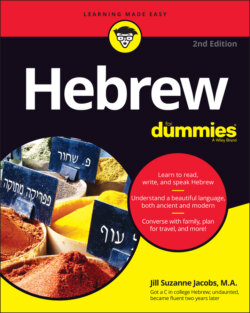Читать книгу Hebrew For Dummies - Jill Suzanne Jacobs - Страница 37
Naming nouns
ОглавлениеIn Hebrew, all nouns are either masculine or feminine. They’re conjugated according to number (singular and plural). The noun book (a masculine noun), for example, can be conjugated two ways:
סֵפֶר (seh-fehr; book)
סְפָרִים (sfah-reem; books)
Look at this example of a feminine noun:
מַזְלֵג (mahz-lehg; fork)
מַזְלְגוֹת (mahz-leh-goht; forks)
When masculine nouns are conjugated in the plural, they usually have an ים (eem) ending, and when feminine nouns are conjugated in the plural, they usually have an וֹת (oht) ending. The Nonbinary Hebrew Project proposes adding הto the suffixes of most words to create a third, nonbinary gender category: מִגְדָּר רָחָב (migdar rahav).
Check out Table 2-1 for some common Hebrew nouns.
TABLE 2-1 Identifying Some Common Nouns
| Hebrew | Pronunciation | Translation |
|---|---|---|
| בַּיִת | bah-yeet | house |
| דֶּרֶךְ | deh-rech | way, road |
| אִישׁ | eesh | man |
| אִשָּׁה | ee-shah | woman |
| כֶּסֶף | keh-sehf | money |
| מַפְתֵּחַ | mahf-teh-ach | key |
| מַגֶּבֶת | mah-geh-veht | towel |
| מְקָרֵר | mahk-rehr | refrigerator |
| מַזְגָן | mahz-gahn | air conditioner |
| מַזְלֵג | mahz-lehg | fork |
| מְכוֹנִית | meh-hoh-neet | car |
| מִהְבָּח | meet-bahch | kitchen |
| מִבְרֶשֶׁת | meev-reh-sheht | brush |
| אֹכֶל | oh-ḥehl | food |
| סֵפֶר | seh-fehr | book |
| שֶׁמֶשׁ | sheh-mehsh | sun |
